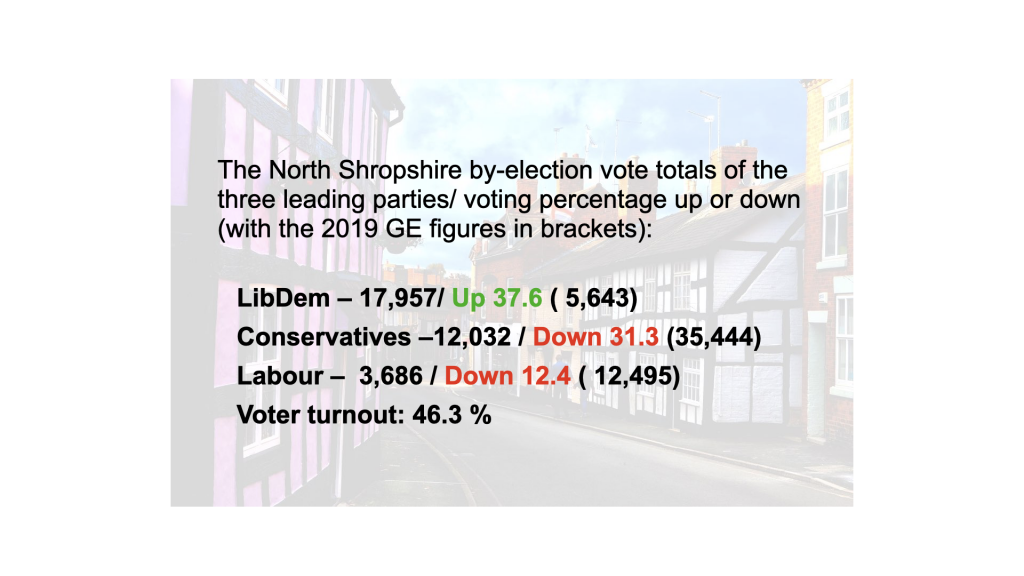
At first glance, the stunning LibDem by-election victory yesterday (17 December) in North Shropshire would NOT seem to point to the need for electoral reform and the creation of an electoral pact to pull off such a legislative feat.
In fact, precisely the opposite. After all, successful LibDem candidate Helen Morgan more than tripled her vote total from the 2019 general election and knocked off a Tory in a seat that has been as safe for that party as the crown jewels. The Liberals did briefly hold the seat in 1904-1906, but otherwise, rural North Shropshire has been deepest Tory blue since the constituency was created in the year 1832.
Moreover, Morgan placed third in 2019 and then was far, far behind disgraced former Conservative cabinet minister Owen Paterson whose resignation in early November necessitated the by-election. Paterson won by almost 23,000 votes in 2019.
THE ESSENCE OF TORY SAFE SEATISM
In short, strongly pro-Brexit North Shropshire was (at least until yesterday) the essence of “safe seatism” of the Tory variety.
Electoral geeks tell us that that Thursday’s swing of 34.1% from the Tories to the LibDems has made it into the record books of the top ten largest electoral swings ever in a British by-election. Pollster John Curtice called it “an earthquake.”
If, so the argument goes, Morgan can knock off the Tories in North Shropshire, the Tories are ripe for plucking everywhere. This is “a watershed moment,” ecstatic LibDem leader Ed Davey told reporters.
“NIGHTMARE BEFORE CHRISTMAS.”
But is it? No doubt, “the party is over” for the Conservatives in the short term. Less than an hour after the by-election results were announced at 4:15 a.m., the Tory house organ, the Daily Telegraph, headlined its coverage: “NIGHTMARE BEFORE CHRISTMAS.”
And no doubt this by-election was a hard and sharp slap in the face to “beleaguered” – as he is labelled – Prime Minister Boris Johnson. Moreover, the North Shropshire defeat followed, by less than 72 hours, the largest Tory backbench rebellion at Westminster since Johnson’s December 2019 victory. (The first rebellion was over Covid pandemic regulations.)
JOHNSON: “TWO STRIKES AGAINST”
These Tory backbenchers worry that the rebellious – if we can call it that – “spirit of Shropshire” might also infect local voters on their own electoral patch. Johnson now has “two strikes against him,” said one.
Certainly, the by-election was a welcome sign that one sample of British electors have had quite enough, thank you, of Tory sleaze and corruption, as practiced by both their own former MP and across the whole government.
But to get to the nub of the argument: while only political tribalists would begrudge Davey (and LibDem members) their joy, was he correct in his assessment that the LibDem victory showed that “the Tories can be beaten everywhere”?
It is more complicated than that.
A PRODIGIOUS VOTE HOOVERING MACHINE
Especially in the past 40 years, the Tory party has become a prodigious vote hoovering machine. According to disgruntled Tory party activists, that machine operated in a creaky fashion during this past by-election. Some heads may soon roll – even on Friday morning as I write this blog – and we can be certain the Tories will have bags and bags of cash available for a future general election campaign.
And in that campaign, not just one seat (North Shropshire) but hundreds of “safe seats” will be contested. Remember that a total of 10% of House of Commons seats haven’t changed hands since the end of World War One and a staggering total of 192 seats have not switched since World War Two ended, one study by the Electoral Research Society found.
THE ANTI-DEMOCRATIC NATURE OF FPTP
Safe seats are an anti-democratic feature of the First-Past-The-Post (FPTP) voting system that we have in the UK; millions see no point in even voting. (For more on this subject, see this recent blog. )
Yes, the LibDems were able to assemble an impressive “army” of more than 700 activists to descend on North Shropshire. No party, however, can pull that off in 650 constituencies at the same time.
A second structural feature of FPTP is that the number of votes required to elect MPs for some parties is far greater than for other parties. For example, in the 2019 general election, it took 336,038 votes to elect one Lib Dem MP, but only 38,264 votes to elect a Conservative MP. What could be more unfair than that!
There is no need to belabour the point; FPTP is an archaic voting system and, at present, greatly favours the Tories.(It once favoured Labour.) Proportional Representation (PR) is badly needed to abolish safe seats and unequally-weighted votes among other problems.

TACTICAL VOTING ALLIANCE FROM BELOW
To bring in legislation that will make PR the law of land will require a massive united effort of parties which support PR. All of the “small parties” already do. At the Labour Party conference in September 2021, a total of 80% of delegates supported a motion calling for PR to become part of a Labour election manifesto commitment. Political observers predict PR will become party policy in September 2022.
Yet the Tories as a party are four-square against PR and the likelihood of Labour winning a majority by itself at the next election appears more and more remote. In the North Shropshire by-election, Labour dropped from second place in 2019 to a distant third and its total vote fell from 12,495 to 3,686 votes, even though deputy leader Angela Raynor did campaign there for some hours on 14 December. (No surprise why Labour did poorly and was confused in its messaging as to how interested it really was in winning; Keir Starmer’s contribution was a single tweet at 7:00 p.m. on voting day, while Ed Davey visited North Shropshire five times).
There is a positive side to this poor Labour showing for those who are in favour of electoral reform. On the one hand, it may further squelch illusions of at least some in Labour that “we can win a GE alone…and as a majority.” On the other hand, at least some “usual Labour voters” voted LibDem in 2021 and Helen Morgan made a point in her victory speech to thank these voters for “lending her” their vote.

So, in some ways, the LibDems victory was the result of a tactical voting “alliance from below” and has some similarities to the LibDem by-election victory in Chesham and Amersham back in the spring.
Said a LibDem supporter of GET PR DONE! “Labour supporters in the North Shropshire constituency exercised clear judgement as to how best to defeat the Conservative. I look forward to campaigning to return the favour in the next by-election where the Labour candidate is best placed to defeat the Conservative.”
All manner of tactical voting schemes and electoral pacts will be needed to elect a progressive government that will bring in electoral reform. All parties have different strengths. The defeat yesterday of opponents to electoral reform marks another small step on that journey, even if PR was not a direct election issue.
British voters do indeed want change. We need to convince more and more of them that electoral change must be a key component.
+++++++++++++++++
IN PROPORTION is the blog of the cross-party/no-party campaign group GET PR DONE! We are campaigning to bring in a much fairer proportional representation voting system. Unless otherwise stated, each blog reflects the personal opinion of its author.
We welcome contributed blogs. Send a brief outline (maximum 75 words) to getprdone@gmail.com
Join the very active Facebook group of GET PR DONE! (+2,600 members as of December 2021.): https://www.facebook.com/groups/625143391578665/